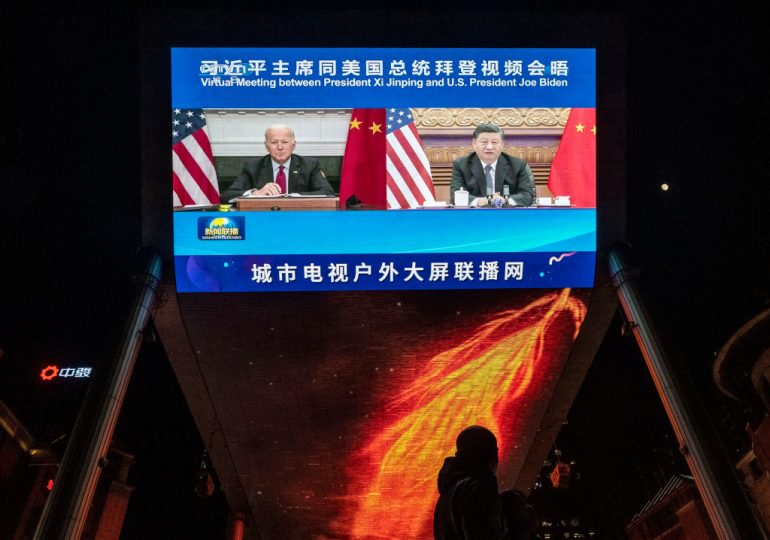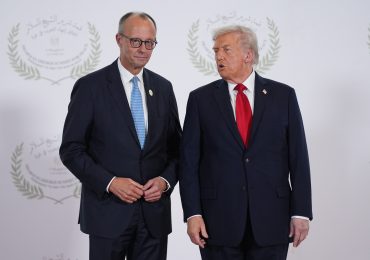As President Joe Biden prepares for his meeting with Chinese leader Xi Jinping at the Asia-Pacific Economic Cooperation summit in San Francisco on Nov. 15, he faces an epochal choice. Will the U.S. government bow before belligerent demands for intensifying confrontation and exclusion, or will it seek to deepen the recent diplomatic opening between the two countries?
[time-brightcove not-tgx=”true”]
On one side stand critics of the Biden administration, such as the Republican members of the House of Representatives select committee on China, who demand that discussions with China be ended unless they result in complete surrender to their demands. Those calling for confrontation seem heedless of the terrible consequences now looming from a conflict pitting the world’s two most powerful countries against each other.
On the other side is the potential for a mutually beneficial modus vivendi between our nations, which could establish a newly inclusive and prosperous global system. Though the Biden Administration has begun to explore the possibilities of diplomacy with China, it also finds itself caught in zero-sum formulations of the relationship that are likely to strengthen restrictive and exclusionary measures at the expense of both competitive and cooperative opportunities.
U.S. debate today conceals the dangers of our current China policy by terming every antagonistic policy a form of “competition.” In reality, exclusion is the opposite of competition. Where competition is a relationship between two parties that necessarily entails connection and has the potential to be carried on in healthy ways, exclusion is an attempt to sever both competitive and cooperative connections. Unlike competition, the victim immediately understands exclusion to be an illegitimate form of aggression. If the victim is strong enough to fight back and the domain from which they are being expelled is consequential enough, conflict is a likely outcome.
American leaders are gambling that they can exclude China from some of the most lucrative and strategically important sectors in the global economy without pulling the world into conflict. The bet is that, forced into a permanently subordinate position, China’s leaders will accept the U.S. version of a rules-based international order and compete vigorously within its limits.
Beginning under Trump, then expanded and systematized under Biden, the U.S. has assembled an increasingly imposing body of exclusionary policies aimed at cutting Chinese businesses out of crucial technologies and preventing high value Chinese companies from accessing consumers and investment from the rich countries. U.S. leaders are exploring strategies to sideline Chinese companies in rapidly growing developing economies as well.
To achieve these aims, new instruments have been added and existing authorities expanded in novel ways. For example, in the past, the Commerce Department directed its power to ban exports with potential military uses only against goods directly related to weapons production. Those restrictions targeted specific buyers rather than whole countries. Under Biden this power was redeployed to cover entire categories (like advanced semiconductors) whose main application is commercial rather than military, and to exclude China specifically—prohibiting every Chinese company from acquiring them, the machinery to make them, and American individuals’ expertise to develop the technology.
Read More: China Is Striking Back in the Tech War with the U.S.
Biden not only built on Trump’s regulatory innovations, he also significantly sharpened their capacity to suppress Chinese development by rebuilding U.S. alliances with the other technologically advanced countries. As Commerce Secretary Gina Raimondo noted: “If we really want to slow down China’s rate of innovation, we need to work with Europe.” Far from “competitive actions,” these measures are best understood as attempts to remove competition.
The Biden Administration wants to limit the extent of its China exclusion to the most strategically important sectors and markets—what it calls “derisking” as opposed to “decoupling.” Yet the Chinese government has consistently branded such calming words as deceptive. The Biden administration is, after all, pursuing a course that directly challenges the legitimacy of the Chinese Communist Party.
The Party claims a monopoly on power on the claim that it won China’s independence after a century of domination by the imperialist powers and it brought development to the nation and opportunity to the people. The same countries that once victimized China are now banding together in an attempt to stifle China’s economic growth and global status. That not only threatens the Party, it represents an explosive provocation to popular Chinese nationalism. Accepting permanent subordination would be an existential threat to China’s leaders.
U.S. policy also poses, in Xi Jinping’s words, “challenges of unprecedented severity to the country’s development” as China attempts a high stakes transition away from property speculation as the engine of growth. Chinese leaders—like U.S. leaders thinking about problems in the U.S. economy—have concluded that the solution lies in high-tech sectors. Exclusionary U.S. policies thus threaten to cut off the Chinese economy’s escape route from the danger of financial collapse.
But what if the ingenuity of Chinese business and state overcomes U.S. attempts at exclusion? In late August, three years after the U.S. attempted to destroy Huawei—one of China’s most successful multinational corporation and a focus of popular adulation in the country—the company released a new cell phone featuring Chinese-produced 7-nanometer chips from Shanghai-based Semiconductor Manufacturing International Corporation (SMIC). The capacity to produce such chips is precisely what U.S. restrictions were meant to forestall. If the bet that China will accept exclusion is looking shaky, so too is the bet that exclusion is even achievable.
U.S. leaders are responding to Chinese technological advances not with doubts about the strategy but with calls to push it ever further. Critics of Biden call his exclusion measures weak, demanding full embargoes on Huawei and SMIC. Others go even further. At a recent hearing, several members of the China select committee denounced any trade at all with China for strengthening the power of the country.
The alternative to today’s self-propelling spiral into conflict is not credulity toward Chinese leaders’ fine words about harmony and cooperation. Instead, it is precisely the healthy competition that the Biden administration says it wants.
What has been missing from U.S. strategy, however, are steps to establish a sound framework for the relationship. Only when both sides can recognize a common good that exceeds their own narrow interests will it be possible to see competition as tolerable or even welcome rather than as an existential threat.
The first step for both sides is to admit—contrary to the regular polemics each deploys accusing the other of undermining the international order—that the other is quite similar. Both countries are, in fact, status quo powers with an interest in urgently needed reforms to address serious problems in the global system.
The project of forging a new international common good would focus on reforms to reduce the zero-sum pressures in the global system currently pushing the U.S. and China against each other. In the three key realms that need to be addressed—global authority and security, the global economy, and the climate crisis—China is sometimes exacerbating tensions. But it is also pursuing promising reforms, like its proposals for increasing the power of large developing countries in global governance and for supporting development in the Global South, that would expand the scope for positive-sum outcomes.
Washington needs to reorient its approach to Beijing. Rather than seeking to exclude China in the name of “competition” and to discredit any initiatives that might increase China’s prestige, U.S. leaders should affirm and build on China’s constructive proposals. The path to healthy competition runs through a difficult but rewarding negotiation over how the international order can include everyone—for the benefit of us all.
Leave a comment
















